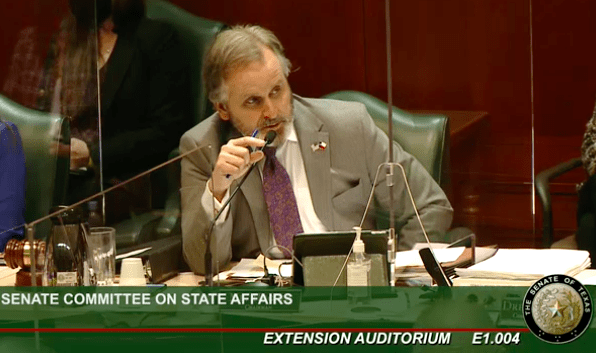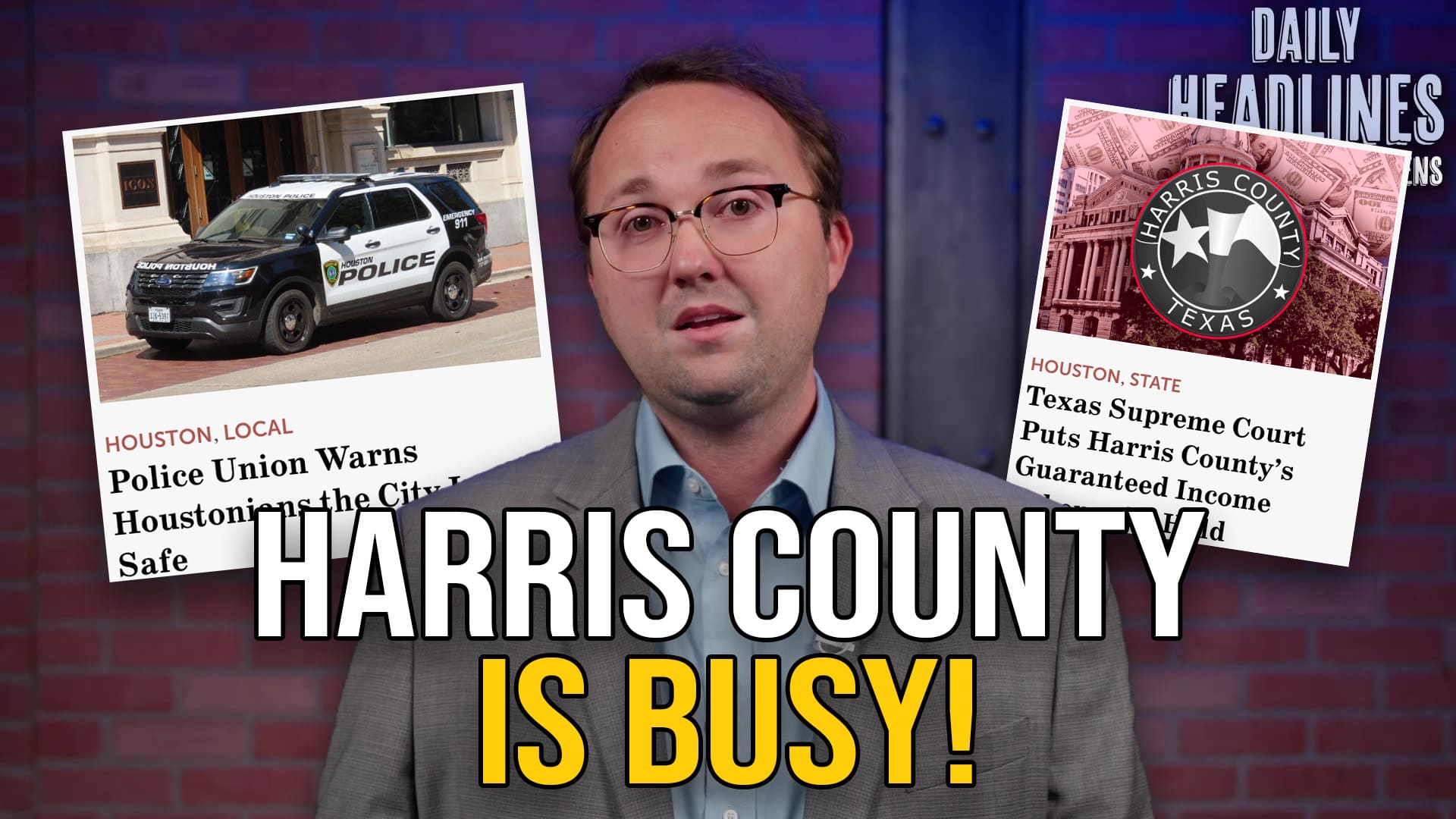After Democrats used a procedural move Monday to delay a scheduled Texas Senate committee hearing on key election integrity legislation, the panel met again Friday to take public testimony on a dozen Republican-priority election bills, drawing scores of citizens back to the Capitol to testify on the measures.
“This conversation is going to take place,” State Sen. Bryan Hughes (R–Mineola) said at the opening of Friday’s Senate State Affairs Committee hearing.
But conservative advocates for the election reforms had to wait hours to participate in that conversation, after Hughes relegated election-bill witnesses to the end of the 13-hour hearing.
Hughes chairs the committee and authored the Senate’s top-tier election integrity legislation Senate Bill 7, the highest-profile of the 12 election bills on Friday’s agenda.
Election integrity is a top legislative priority of the Texas GOP and the only one also declared an emergency item by Republican Gov. Greg Abbott, who said earlier this month he is ready to sign “robust” election reform bills sent to his desk by the Republican-controlled Legislature.
Senate Bill 7
Republicans have loaded SB 7 with reforms sought by election integrity advocates.
The comprehensive “omnibus” bill includes dozens of provisions relating to voter registration, voting by mail, voter assistance, poll watchers, voting systems, and more—all intended to make voting more secure, accurate, and transparent, according to Hughes.
“It is important that elections be free and fair and accurate, and that people know they are free and fair and accurate,” Hughes said Friday.
SB 7 also includes criminal and civil penalties for fraud and official misconduct.
Among other provisions, the bill would:
- require all Texas voting systems to have an auditable paper trail
- prohibit officials from sending unsolicited mail-ballot applications
- implement a tracking system for voters who request mail ballots
- require documentation from voters applying for mail ballots due to disability
- set uniform early voting hours and voting methods statewide
- allow poll watchers to observe and record election officials’ activities
- allow surveillance cameras in ballot-counting locations
- assess civil penalties for officials who don’t follow election code
A revised version of Hughes’ original bill (called a committee substitute) would also:
- amend times when early voting polling locations can be open
- prohibit drop boxes for mail ballots
- define what it means for poll watchers to observe
- require approvals from multiple state officials for counties to accept more than $1,000 in private cash for election administration
Public Testimony
By the time public testimony on the election integrity bills began at 5 p.m., citizen supporters were once again fuming—this time that they’d been left waiting for hours behind witnesses for lower-priority bills. Well over 100 people registered to speak, but many left before being heard.
Those who stayed were limited to two minutes to testify on all 12 bills.
“What we are experiencing in this country and state is a rampant ability to cheat,” said James Perry, one of the bills’ proponents who remained. “If you don’t pass this law, all these bills, you’re opening yourself up to be replaced by someone who is dishonest. We can’t afford that as citizens of Texas.”
Activists from leftist organizations that typically oppose election integrity measures—including the Brennan Center, MALDEF, the NAACP, Texas Civil Rights Project, and the League of Women Voters—testified against SB 7, as did multiple disability-rights advocates.
Hughes presented two other bills Friday.
Senate Bill 1234 would require all Texas elections to use voting systems that produce a paper audit trail by March 2024, similar to a provision included in his SB 7.
“This will give people confidence that their votes will be counted, and counted accurately,” Hughes said.
State Sen. Judith Zaffirini (D–Laredo) wanted to know where the tens of millions of dollars to pay for the upgraded equipment would come from. “I think the goal is worthy, but I would hate to support an unfunded mandate.”
Hughes said some federal funds may be available.
Senate Bill 1235 would establish a process for verifying the accuracy of voter rolls whereby the Texas secretary of state and Texas Department of Public Safety compare data monthly. If the cross-checks find ineligible voters, the SOS would notify local registrars, triggering follow-up verification.
Bettencourt’s “Integrity Seven”
Citizens also had a chance to testify on four bills from a package of reforms filed by State Sen. Paul Bettencourt (R–Houston) dubbed the Integrity Seven.
Senate Bill 1112 would make it a Class A misdemeanor for any local election official to suspend an early voting ballot board’s requirement to verify voters’ signatures on mail ballots or applications.
“This is the job they’re supposed to be doing,” Bettencourt said. “It’s in the code now.”
Christina Adkins with the Texas secretary of state’s office confirmed signature verification “is a required element at all times” for mail-ballot applications and ballot carrier envelopes. Bettencourt’s bill just adds a criminal penalty.
“This bill does not add new requirements on the voting process. It simply requires that existing law must be maintained,” said Alan Vera, head of the Harris County Republican Party’s Ballot Security Committee. Vera testified that during the November 2020 election, Democrat election officials contemplated letting mail ballots dropped off in person bypass signature verification.
Senate Bill 1113 would hold local officials accountable to maintaining accurate voter rolls by authorizing the secretary of state’s office to withhold certain state funding from county election officials who fail to cancel registrations of ineligible voters in accordance the law.
“If they’re not doing their job, they should not get paid,” said Bettencourt, who served many years as Harris County’s voter registration official. “The integrity of the voter roll is paramount.”
“We need to get serious about the quality of voter rolls,” said Vera, who testified to receiving multiple complaints of mistakes on Harris County’s voter list in 2020.
“Poorly maintained voter lists are the raw material by which voter fraud can occur, especially by mail,” added Chuck DeVore with the Texas Public Policy Foundation, who has researched Texas voter rolls and mail-in voting procedures.
Senate Bill 1114, another voter list maintenance measure, would add DPS citizenship data obtained by the secretary of state to the information local voter registrars use to maintain voter rolls.
Bettencourt said the bill essentially codifies current practices implemented in accordance with a settlement agreement regarding how the SOS will use DPS citizenship data. It does not call for automatic suspension of any voters.
“DPS data had granularity to do the job right, but it wasn’t done right,” Bettencourt said of DPS data-sharing mistakes in 2019 that led to the legal settlement. “It’s time to codify best practices now. That’s what SB 1114 does.”
“This bill is a commonsense and carefully calibrated measure,” added DeVore, citing research that found 75,000 ineligible people are on Texas voter rolls, including about 36,000 noncitizens.
Senate Bill 1116 is a transparency measure that would require local governments to post election results on their websites “no more than two clicks away from their homepage,” ensuring elections results for any city, county, or school district are available to citizens “front and center,” not buried.
“For some reason, these results are not easily accessible,” said Bettencourt.
Other Republican Bills
Three other Republican election integrity bills were on the agenda:
Senate Bill 598 by State Sen. Lois Kolkhorst (R–Brenham) would require all Texas elections to use voting systems that produce an auditable paper trail by August 2026 (similar to Hughes’ SB 7 and SB 1234) and launch a pilot program for counties to conduct risk-limiting audits of election results starting in 2022.
“Advances in technology have increased the threat of electronic interference in elections,” said State Sen. Bob Hall (R–Edgewood), who laid out a committee substitute for Kolkhorst. Hall said Texas is one of only 13 states that doesn’t require a verifiable paper trail.
Rice University computer science professor Dan Wallach testified in favor of SB 598. He said Texas election systems “face credible threats” that Kolkhorst’s bill and others address by requiring paper audit trails.
Senate Bill 1340 by State Sen. Dawn Buckingham (R–Lakeway) proposes a major overhaul of the state’s voter registration system. It would designate the secretary of state as the chief voter registrar for the state, require the SOS to use DPS and Department of Homeland Security data to verify voters’ citizenship, and direct the SOS and DPS to establish a secure online voter registration system, among other provisions.
Senate Bill 1387 by State Sen. Brandon Creighton (R–Conroe) would require voting systems used in Texas elections to be manufactured in the United States by companies headquartered in the U.S., effective September 2021.
Democrat Bills
Two Democrat-authored bills were also heard Friday.
Senate Bill 331 by State Sen. Nathan Johnson (D–Dallas) would modify requirements for serving as an interpreter at the polls. The bipartisan bill (a House companion is authored by a Republican) is a revised version of previously passed legislation that was blocked by the courts as too restrictive.
Senate Bill 1018 by State Sen. Judith Zaffirini (D–Laredo) would give local election officials the option to let voters correct defects in their mail ballots, such as missing or mismatched signatures, or to cancel their mail ballots and vote in person. Her committee substitute struck provisions in her original bill that would have allowed voters to update their address with a vote-by-mail application.
Several Election Bills Advance
After more than five hours of public testimony, committee members voted to send SB 7 to the full Senate, along with seven other election integrity bills: SB 331, SB 1018, SB 1234, and all four of Bettencourt’s bills (SB 1112, SB 1113, SB 1114, and SB 1116).
Bills passed out of committee may be placed on a calendar for possible consideration by the full Senate.
Texans can send an email to all members of the Senate State Affairs Committee at scstate.affairs@senate.texas.gov. Contact information for individual state lawmakers can be found at Texas Directory.
Details about bills, along with resources to help citizens participate in the legislative process, are available at Texas Legislature Online.





